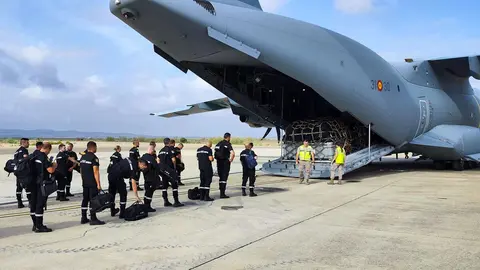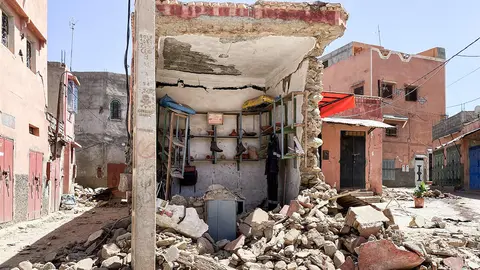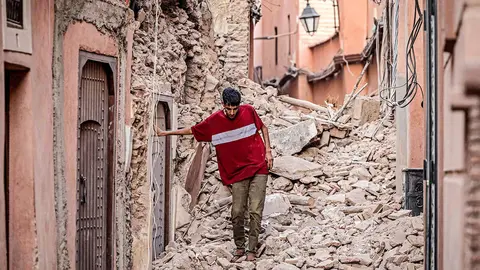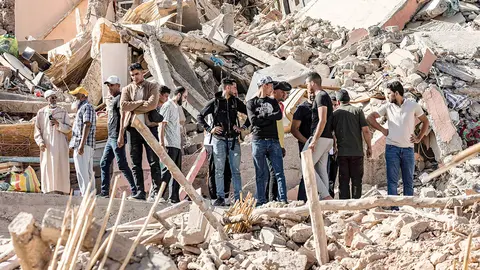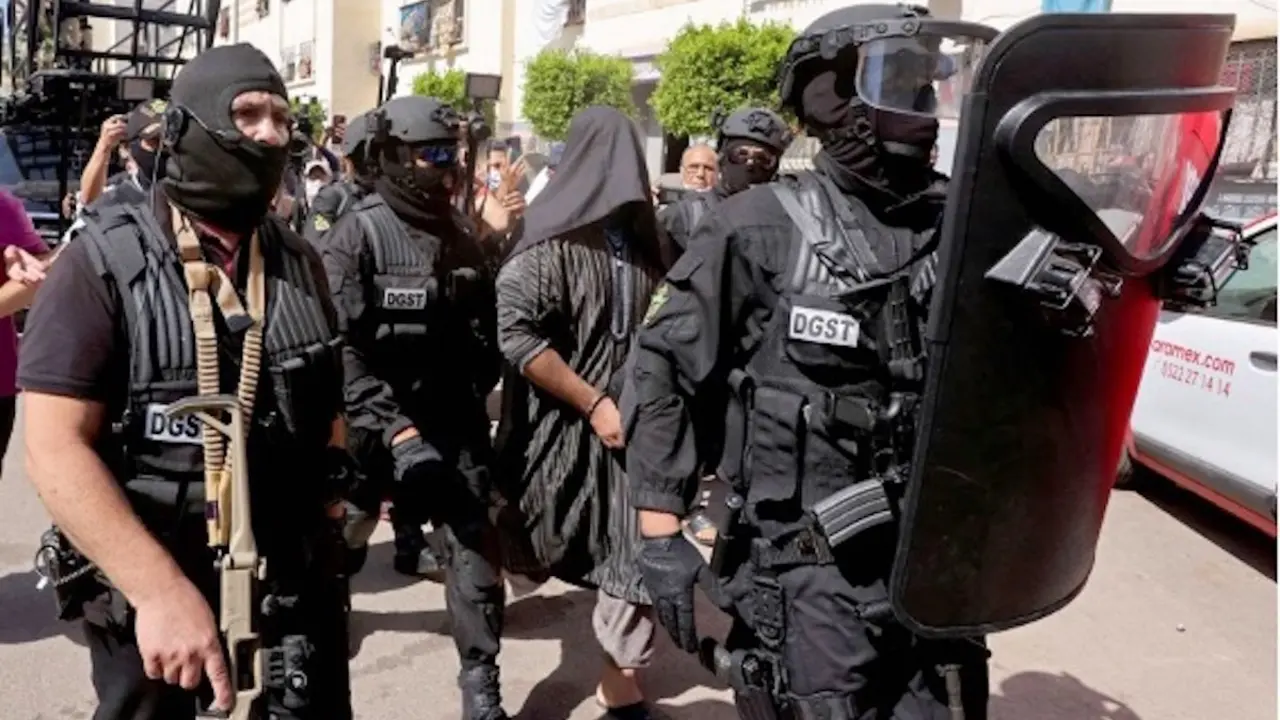Spain and three other countries collaborate in rescue work after the earthquake in Morocco

Spain, the United Kingdom, Qatar and the United Arab Emirates are the four countries that are working on the ground to help with humanitarian emergency and victim rescue tasks following the strong earthquake measuring 7.0 on the Richter Scale that struck Morocco in the early hours of Friday morning, leaving 2,681 people dead and more than 2,500 injured.
The region of Al Haouz and other neighbouring areas such as Taroudant and Marrakech were the worst affected areas with the most deaths and injuries after the earthquake, and it was the area where work began in the first instance, both by the troops of the Moroccan Royal Armed Forces, under the high instructions of King Mohammed VI, and by the units sent by these collaborating nations.
ويركان-تدخلات فرق الانقاذ متواصلة للتوصل الى أكبر عدد ممكن من العالقين تحت الأنقاض وانتشال الضحايا وإغاثة المتضررين من جراء زلزال الحوز المدمر. pic.twitter.com/XgWhtW2kvx
— Royal Moroccan Armed Forces (@MoroccanArmed) September 11, 2023
Morocco did not find it necessary to request assistance from other countries. The formula applied is that of useful and necessary aid at any given moment, as in the case of this earthquake.

Spain, as a neighbouring country and a great ally of Morocco, with which it currently enjoys very good diplomatic relations, has set up a well-organised and coordinated mechanism with the Moroccan kingdom. For example, teams of firefighters from Spanish cities such as Madrid and Huelva and even members of the Military Emergency Unit arrived in Morocco with the work area assigned in advance, with a total team of more than 80 people.
#BuenosDías
— Ministerio Defensa (@Defensagob) September 11, 2023
El equipo de búsqueda y rescate urbano #USAR de @UMEgob ya está desplegado en Marruecos. Los militares españoles cuentan con la certificación internacional de @ONU_es @Insarag para los trabajos en este tipo de catástrofes. Por eso, además de la labor para localizar… pic.twitter.com/7GHt0qwzfM
Spain has sent 86 troops, a team from the Military Emergency Unit (UME) made up of 56 soldiers and four dogs that took off from the Zaragoza Air Base to Marrakech and a second contingent with 30 members of the Special Emergency and Immediate Response Unit of the Community of Madrid (ERICAM) and four dogs from the specialised search and rescue team.
An emergency team from the English West Midlands also travelled to Morocco on Sunday. "There are a lot of people who need help and a lot of people are waiting for us," Syed Muhammad Faisal Sami, director of the UK branch of the Faizan Global Relief Foundation, told the BBC.
جانب من العمل الليلي للقوات المسلحة الملكية لانتشال جثامين ضحايا الزلزال. pic.twitter.com/6WRBuhVKyK
— Royal Moroccan Armed Forces (@MoroccanArmed) September 10, 2023
"The Moroccan authorities have responded favourably, during this specific phase, to offers of support from friendly countries such as Spain, Qatar, the United Kingdom and the United Arab Emirates, which had offered to mobilise search and rescue teams," an official statement from the Moroccan interior ministry said.

Useful and necessary help for good coordination
The King of Morocco himself explained that massive aid is not the best option, being preferable to aid that is useful, effective and well coordinated and with a meticulous assessment of the specific needs on the ground by those in charge of each affected area. Rabat justified its decision on the basis of the "precise assessment" made of the needs following the earthquake and "bearing in mind that a lack of coordination in such situations could be counterproductive".
#زلزال_المغرب
— Leɛyun 🇲🇦 ۞ (@5_ersito) September 11, 2023
على الاقدام او على البغال سوف تصل المساعدات بإذن الله
ها طريق كدايرة لناس لي غير كيهدرو فين الاسعاف صعوبة التضاريس
الناس الي عمرهم شافو جبال الاطلس ولا مشاو تما لا داعي لخلق الفتنة هدا قدر الله. #زلزال_الحوز pic.twitter.com/DKlvCJLAMr
Following the earthquake in the Al-Haouz region, Mohamed VI chaired a working session with the civilian and military leaders of the institutions involved, at which he expressed "the Kingdom of Morocco's most sincere thanks to the many brotherly and friendly countries that have expressed their solidarity with the Moroccan people in this difficult situation, and several of which have expressed their readiness to provide aid and assistance in these special circumstances".
In this vein, the North African country did not ask for help from other nations that could have helped in its case, such as the United States or Germany, with which it enjoys very good diplomatic relations, or even France under the idea that useful and necessary aid is the best for good coordination.

The earthquake in Morocco has reduced several enclaves, such as the village of Moulay Brahim, 50 kilometres from the epicentre of the quake, to ruins, and has plunged the nation into utter grief and shock. Faced with the seriousness of what happened, King Mohammed VI took action and set up a working committee with civilian and military leaders. After assessing the situation and mobilising the Royal Armed Forces and rescue teams to provide assistance and aid, the Moroccan state also asked Spain, the United Arab Emirates, Qatar and the United Kingdom for help.

The Moroccan government accepted humanitarian assistance from these four countries, with which it enjoys very good diplomatic relations. Spain has already deployed firefighters and rescue teams to help in the search for survivors. Meanwhile, other countries were prepared in case a request for Moroccan help arrived, as in the case of the United States. "We're waiting to hear from the Moroccan government to see how we can help and where, but we're ready," US Secretary of State Antony Blinken told CNN.
Rescue and relief efforts are not easy in some difficult-to-access areas, such as those in the Atlas Mountains, and the expert work of these international rescue units is invaluable.
Humanitarian workers face the challenge of reaching the most affected villages in the High Atlas, a rugged mountain range where settlements are often remote and where many houses collapsed.

